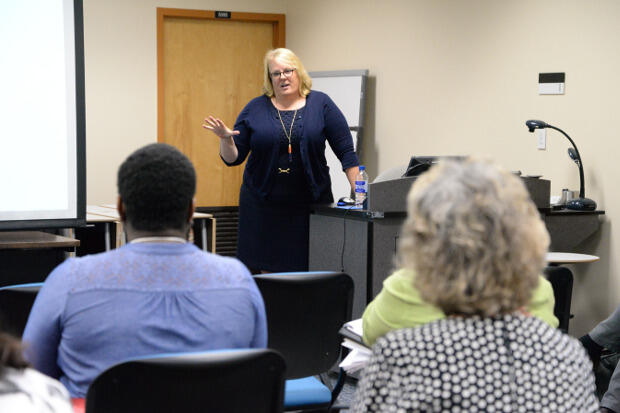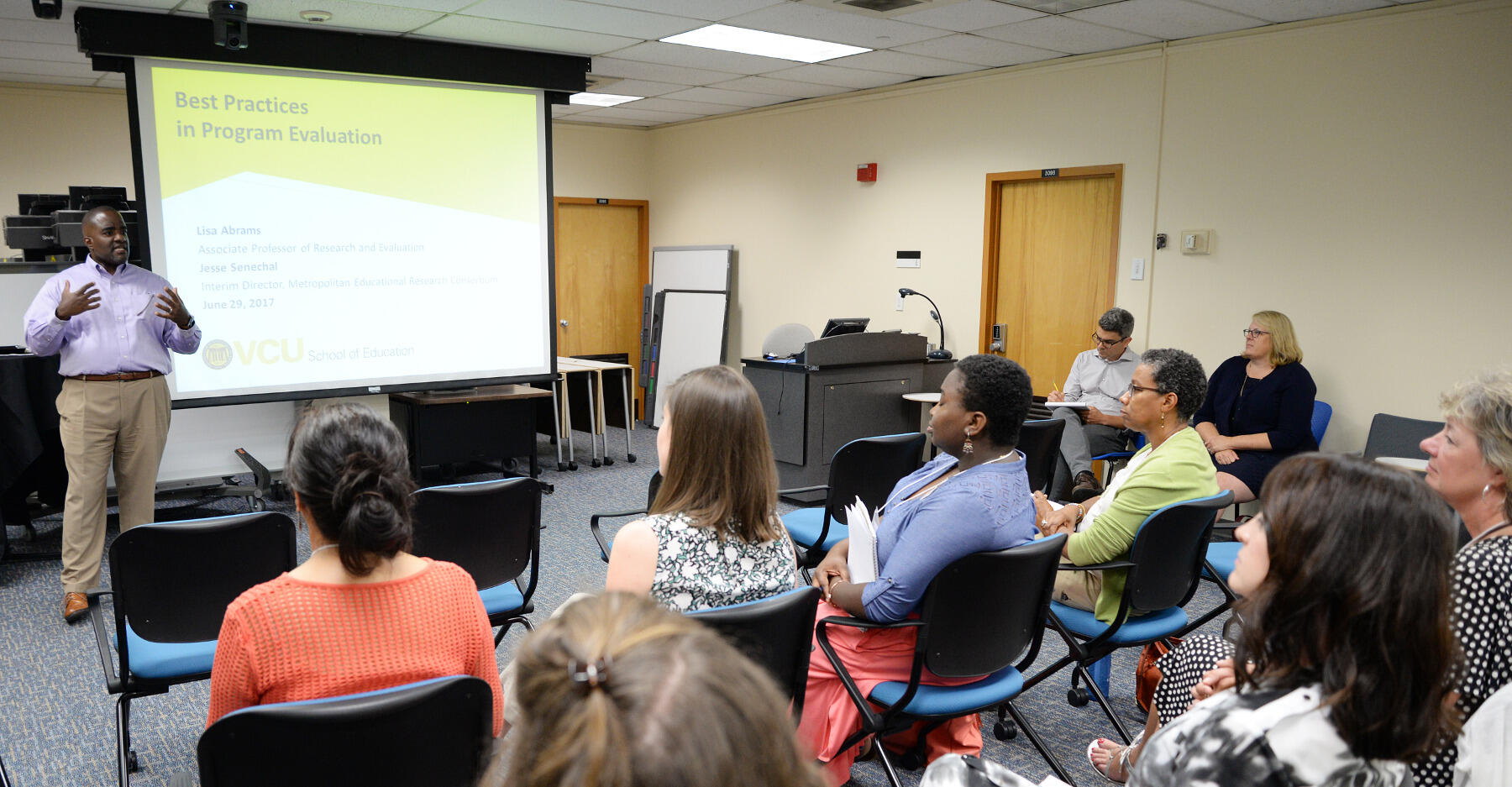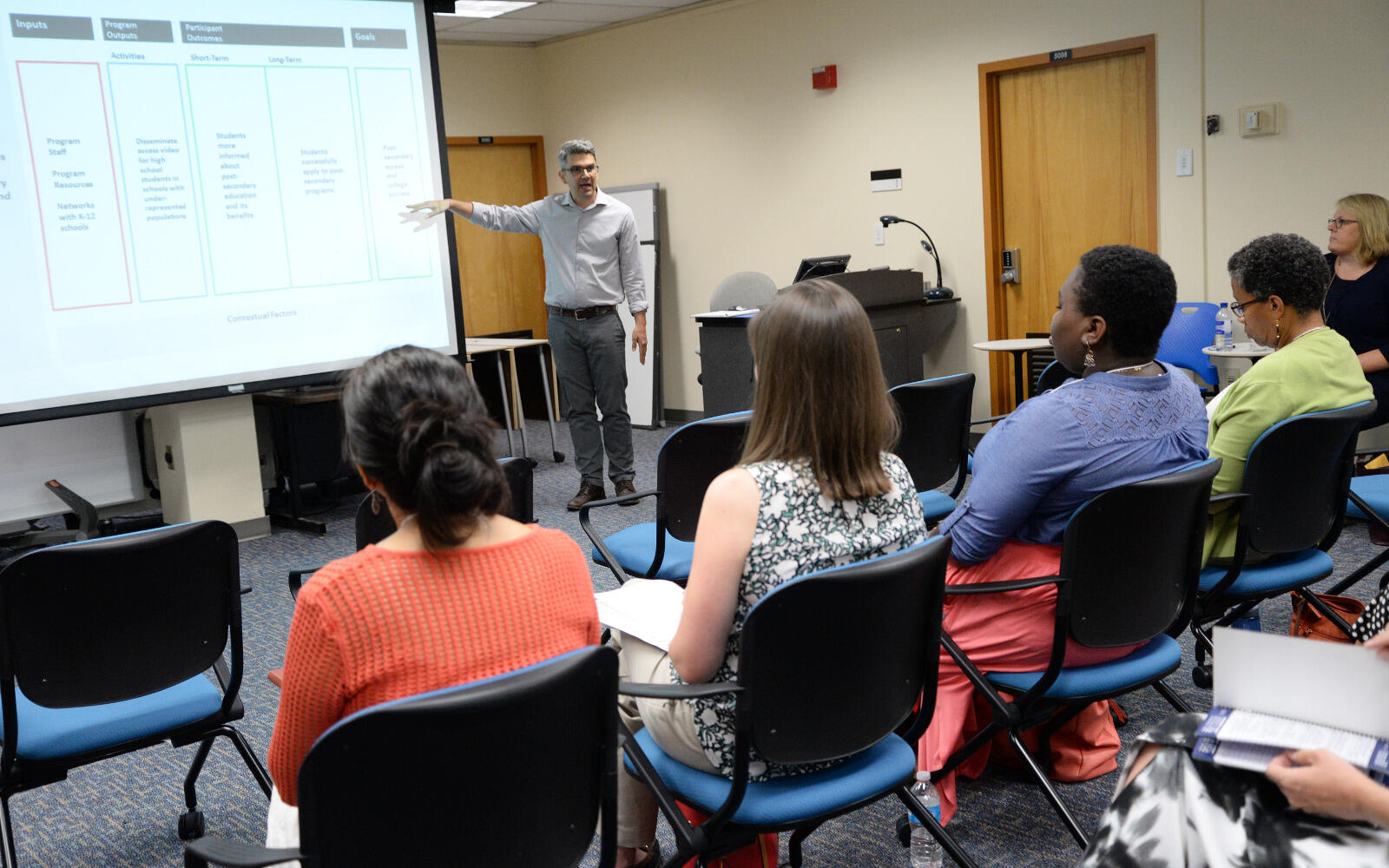
<br>Photos by Brian McNeill, University Public Affairs
July 14, 2017
Richmond nonprofits visit School of Education to learn about best practices for evaluation
Share this story
Leaders of Richmond-area nonprofits that work with children and families visited the Virginia Commonwealth University School of Education last week to pick up valuable advice from VCU faculty members about the best practices for evaluating their organizations’ programs.
“Program evaluation is something that we’ve barely begun to crack,” said Cheryl Groce-Wright, executive director of the Neighborhood Resource Center of Greater Fulton. “So the idea that we might come and get some tips that we could utilize right away was very attractive to us.”
The event, Community Partner and Faculty Engagement Workshop on Evaluation Best Practices, is part of an initiative by Andrew Daire, Ph.D., dean of the School of Education, to engage with community organizations to share VCU’s expertise, build capacity and forge partnerships in areas such as research and evaluation.
“As faculty, we do [things like research and evaluation] every day. We can do a lot of this in our sleep,” Daire said. “And there’s folks in community organizations who understand what’s going on, on the front lines. They understand how to recruit, how to engage. They’re sitting on tons of data. And it’s like, how do we bring those two areas together so that we can develop the type of partnerships where we know what we’re doing and where we’re collaborating?”

Last fall, the School of Education sent a survey to a number of Richmond-area community organizations to ask how the school might be able to support them in their missions. Many of the respondents said they would benefit from professional development, particularly in research and evaluation.
Groce-Wright was among the local nonprofit leaders who took part in the workshop, saying she was looking to make connections with the school.
“I know that the Education School under [Daire’s] direction is really trying to make a difference in the community with community partners. So this was a good opportunity to sort of see what’s going on and see what the ideas are for the work,” she said. “And to hear that there are faculty and students who do this for their job or their schooling, and that they might be willing to use their skills and resources to help us, would be a game changer for us.”
The workshop was led by Lisa Abrams, Ph.D., interim department chair and associate professor in the Department of Foundations of Education, who offered tips in evaluating programs and outcomes; and Jesse Senechal, Ph.D., assistant professor in the Department of Foundations of Education and interim director of the Metropolitan Educational Research Consortium, who walked the attendees through using “logic models” to evaluate their programs.
“Often when I have people come to us and talk about wanting an evaluation done, the first question is: Why do you need this done? Is this about needs assessment? Is it about cost effectiveness? Is it about justifying your program for grant purposes? Is it about program improvement? These are all specific uses, and the use should really guide the [evaluation] work that you do,” Senechal said. “Don’t just do it for the sake of doing an evaluation. Do it for a specific purpose.”
Sue Rockwell, executive director of Reach Out and Read Virginia — a nonprofit organization that works with doctors and nurses to promote early literacy among young children — also attended the workshop. For her organization, evaluating program effectiveness and outcomes is incredibly important, so she was glad to hear about the latest best practices.

“I have used the logic model in the past, but this explained it so well, they did such a good job of educating me on exactly how you’re supposed to do it,” she said. “I’ve done it, but I feel like I understand it intrinsically now. I really do.”
The workshop was the first step in Daire’s initiative to facilitate new collaboration between the School of Education and community organizations.
“We will be doing this again,” he told the nonprofit leaders. “This is something that we’re looking at doing three or four times a year where we can bring folks together. So spread the word when you go to your different meetings where you’re collaborating with other folks in the community.”
Subscribe for free to the VCU News email newsletter at http://newsletter.news.vcu.edu/ and receive a selection of stories, videos, photos, news clips and event listings in your inbox every Monday and Thursday during the academic year and every Thursday during the summer.
Subscribe to VCU News
Subscribe to VCU News at newsletter.vcu.edu and receive a selection of stories, videos, photos, news clips and event listings in your inbox.










